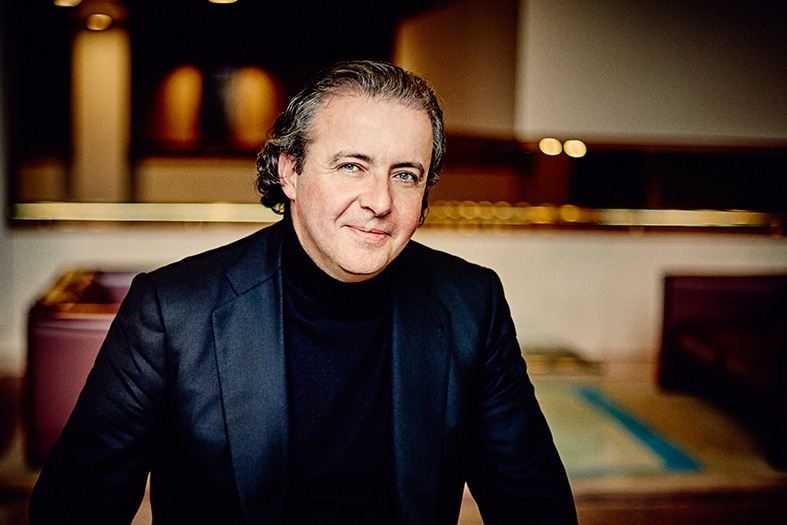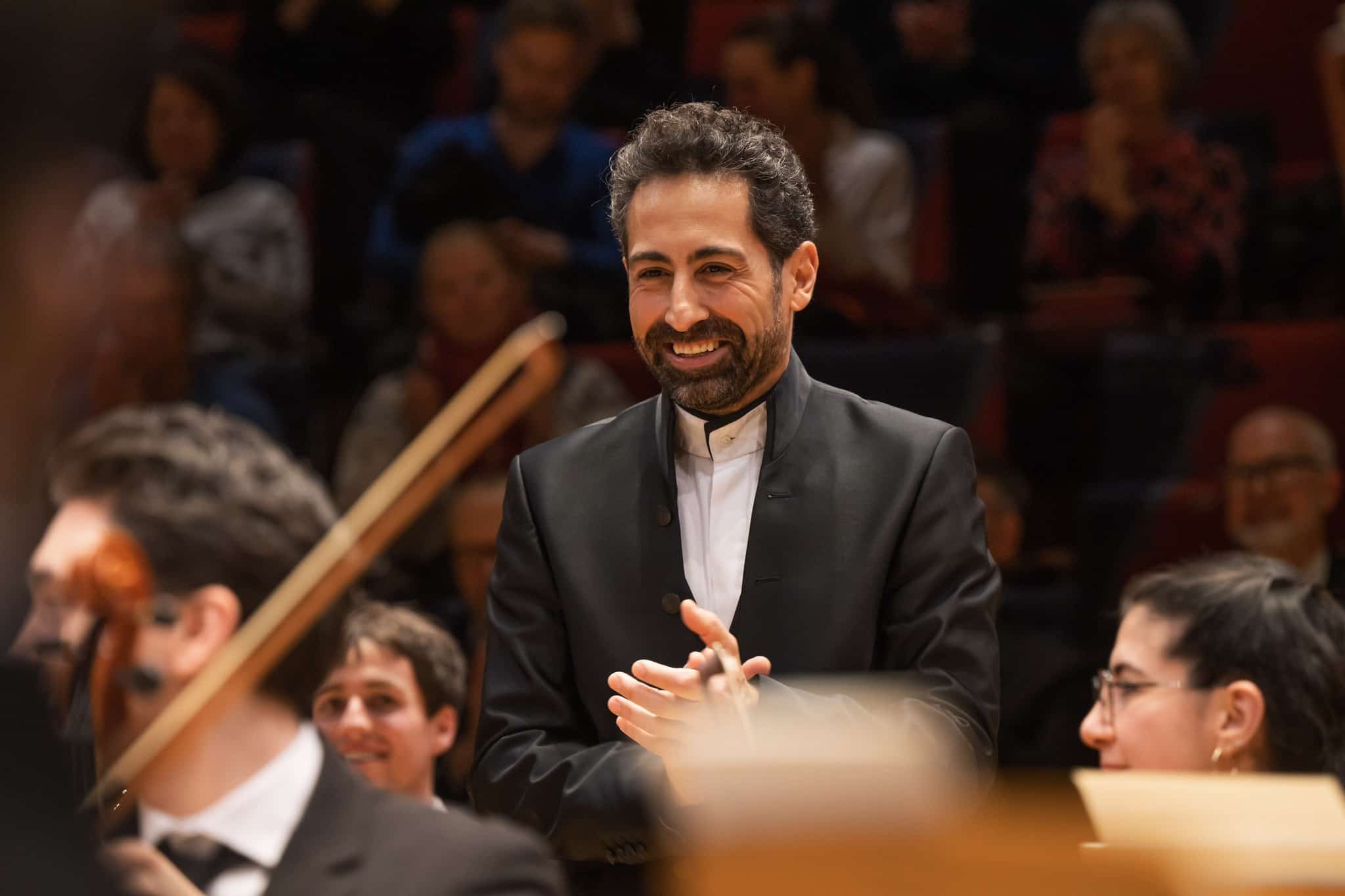Glenn Gould’s most revered composer
mainI’ve been immersed in Schoenberg all week.
So was he.

Friends of Lise Davidsen are delighted to learn…

In the orchestra’s hot seat since 2001, the…

The much-loved Spanish conductor Juanjo Mena has taken…

Nabil Shehata has just taken over the artistic…

Session expired
Please log in again. The login page will open in a new tab. After logging in you can close it and return to this page.
Now try Berg’s Kammerkonzert. It was written for Arnie’s 50th. Complete astounding masterpiece.
More of the same.
Oh dear, once again it has been left to me to be the voice of reason. You have to remember Arnie faced enormous challenges in pursuing his chosen career because he lacked any natural gift for melodic invention, the very thing that was once considered a basic pre-requisite for becoming a composer.
His greatest achievement and the sure sign of his genius, was being able to come up with a way around that. In doing so he also empowered subsequent generations of aspiring creatives, who to a man (or even on occasions, woman) possessed that same handicap. That is a very powerful idea indeed. It only became a powerfùlly destructive one later.
It is easy to make sense of the form of this work via textbook classical music analysis. In doing so we can admire the structure and complexity of the work for what it is. There is absolutely nothing wrong with that, if that’s what interests you.
But lets not make the mistake of failing to notice that the notes in this work do not relate to each other in an naturally emotional and meaningful way, because the reason those notes have been chosen in the order they have, is that they are the product of a method that sets out to achieve something altogether different. To some, that makes listening a bewildering and alienating experience, for others, an intriguing and adventurous one.
For my part I cannot, no matter how I try, seperate the music itself from the malicious, destructive, selfish and catastrophically harmful actions of it’s advocates. If we ever are lucky enough to move on from this, I hope we find a way to ensure that never again will a single interest group of any persuasion be able to take control of music’s creative direction.
The voice reason? As a rule, Schoenberg himself was anything but that.
He was also very German and so most likely horrified at someone calling
him Arnie…so presumptuous and low brow, don’t y’know.
Like Lennie, like Jimmy….WHISPER his name and you’re on the inside track
pronto.
Well Austrian, but point well made. Arnie may not have liked it. He took himself, and the great science of numerology that he was diligently studying when he invented his Zwölfton thing, very seriously indeed.
In other words, if you don’t like it, how can it be good?
No.
@David — Well said!
Hey folks, at this venerable stage in my life (I’m 52) to me any music that uses the 12 tones of the equal-tempered scale (in whichever combination) sounds tonal.
Think of it this way: music that does not adhere to a tonal system based on the harmonic series has the power of making us weightless, i.e. free of the pull of gravity. The ‘problem’ with Schoenberg’s music is that it is new music in old clothes. But, aside from that, to me, honestly, this music sounds perfectly ‘normal’. And at times quite beautiful, in fact.
For true weightlessness, listen to this:
https://www.youtube.com/watch?v=6k9tVGNb_kA
Did not need an equalized atonal system to get into the air.
Arnie? Oh, please!
Schoenberg ‘Gould’s most revered composer’?
Prehaps Strauss, Hindemith, Sibelius are more plausible names.
I thought it was Orlando Gibbons…
Easily my favourite composer and his piano concerto is one of the greatest concertos of the 20th century!
This must be the mysterious Schoenberg groupie people talk about but is never seen. Every modernist composer has one.
I admire you your ability to become immersed in Schoenberg’s music. And Gould, my favorite pianist, came closer to making a case for his piano music than anyone else could. But Schoenberg remains a closed book to me, as he has for roughly 50 years. I don’t like the post-Wagnerian romantic pieces, nor the expressionistic atonal ones, nor any of the hardcore 12-tone works. All totally subjective, of course – but I frankly loathe them all.
Neither of my parents were musicians, but they knew, loved and understood music deeply. Consequently, they knew all of my musical loves and hates and everything in-between from the time I started formulating them at age two. When I turned 16, my parents gave me a unique birthday gift that they’d had specially engraved by a jeweler: a silver necklace and a medallion that bore two of my strongest opinions. On one side it read, “LOVE BERNSTEIN” and on the other, “F••• SCHOENBERG” (unexpurgated).
My parents were special individuals, to say the least.
Great story!
This ‘piano concerto’ is a good example of what is wrong with the later Schoenberg: it is a kind of ‘dustbin music’, a very sophisticated way of composing with all the notes which had been carefully discarded by ‘the classics’. We hear the gestures of a Brahms, a Beethoven, of an early Schoenberg, but with notes that don’t relate to each other in any other way than expressing conflict, disruption, ‘wrongness’ – a twisted, highly neurotic, perverse intervention into the art form, a cult of nihilistic ugliness. This is what you get when musical imagination is dominated by an overbearing intellect which has no connection with Nature and culture as it developed over the ages.
For people who like to see themselves as progressive and contemporary (including musicians), and who got tired of classical music, the experience of something entirely unheard of, in the most literal sense, was refreshingly subversive and transgressive. It was the same attraction that communism and fascism exercised at the beginning of the last century – after a war which seemed to prove that society had run its course – and abstract painting and the ‘boxes for living’ posturing as houses developed by the Bauhaus group.
Schoenberg was a most brilliant composer, in terms of gift, but such people are also just human, and obviously he got quite some things terribly wrong. In the same time, Schoenberg’s later music clearly shows what went wrong in the last century: disconnection from everything that represents the best of the human species.
This ‘concerto’ is a very bad work, dressed-up as a ‘classic’, full of pretention but in realy a deplorable flop that is best to be forgotten.
I love it, you can let the music wash over you.
Maybe that is the best way to experience it. But it would signify a more alert aesthetic attitude to really try to follow what is going-on in the imagined space of a piece of serious music.
I have found listening to Schoenberg’s works from all his periods to be very rewarding. The 4th quartet, the piano concerto and Moses and Aron are my favorite works from the 12-tone period. Uchida is my favorite performer for the piano concerto, although I am pleased to here this Gould recording for the first time.
I also admire Hilary Hahn’s performance of the Violin Concerto. In fact I’d like to thank some of great musicians that have invested time and effort in performing the music of AS, and the folks from the Arnold Schoenberg Center who have made some fine youtube videos.
Nice to read your reply.
Sorry, this music is totally incomprehensible to me. It is totally beyond me how and why it is understood or loved by some people I admire, including people I’ve known personally.
When I was 16 years old, I tried for some time a daily dose of his piano works, listening to Pollini’s famous recording. Didn’t get any closer to connecting. Still no change, almost forty years on. And yet during all those years I could swear my understanding of music has deepened, and my tastes broadened.
One must be very unmusical to enjoy this music unconditionally as music and not be disturbed by its perversions.
Pollini, who is a great pianist, has a strongly intellectual bent, which lures him into sound art, without noticing its ridiculousness. Or he rather enjoys the perversions. He even appeared in the ‘scandalous’ Ducros lecture, playing Stockhausen very seriously:
http://www.youtube.com/watch?v=LdYCSGSEHZ4
To all who wish to see this truly historic not to mention hilarious lecture, it is available here: http://www.college-de-france.fr/site/en-karol-beffa/seminar-2012-12-20-15h00.htm
After the lecture, a scandal developed, with particularly nasty attacks from modernist composers from the Boulez circle (actually, encourged by Boulez), and Ducros was quite amazed and hurt by the attacks he received and remained silent on the subject for years.
Obviously, something like a free discussion was not considered acceptable in French modernist circles, and it was not arguments, but personal attacks which were bolted at Ducros, he had not understood the postwar developments, had no idea about the philosophy behind avantgarde movements, he was an amateur composer producing abject imitation pieces so any argument from him could only be crap, etc. etc. – the usual foaming indignation of members of an ideological party trying to shoot down the enemy – and hoping that in the smoke the real evidence that Ducros had presented in his lecture, like the cluster piece by Stockhausen, would disappear from the public’s radar.
Especially Pascal Dusapin, composer of truly morbid, creepy sound art, a veritable [redacted] character, pulled all the stops of modernist ideology and twisted theory to get Ducros out of the way. Fortunately, the College de France simply said: we give the opportunity for our guest speakers to talk about what they want, and they did not apologize.
https://bibliobs.nouvelobs.com/actualites/20130606.OBS2222/musique-c-est-la-guerre-au-college-de-france.html
“I don’t like this music. Therefore, it is objectively bad, and anyone who likes it must be unmusical.” What would you think if someone said that about one of your own compositions?
Gould’s mos revered composer? J.S. Bach of course!
It is the other way around actually: Glenn
Gould is JSBach’s most revered performer.
“Someday even the postman will whistle my melodies.”
-Anton Webern
So Gould revered Schoenberg. He also thought Mozart died too late (no Magic Flute, then). And he had a thing for Petula Clark. The phrase ‘go figure’ applies here, I think.
Gould was a highly gifted neurotic. Of course he would love neurotic music (Schoenberg’s late music, Strauss’ Elektra, Mrs Clark (according to my PA, I never heard of this woman). I have a remarkable recording of Gould playing the three last sonatas of Beethoven: opus 109, 110, 111 – and the intensity and flair is totally captivating and the frustration and irritation is as intense, because he does things with the score that disrupts and twists the music. He uses the score for his own impulsive needs, which is putting the horse behind the cart.
Gould said in an interview that his favorite composer was Orlando Gibbons.
He also said, more than once, that his fav or favs was Jan Pieterszoon Sweelinck, the Orpheus of Amsterdam though he recorded all of one piece of his, a piano transcription from the lute if I remember. His post-tonal fav of favs was Krenek, also just one piece.
I’m guessing that he most enjoyed Wagner. His attitude toward Bach is a little hard to understand, since he often expressed or affected a somewhat condescending attitude. On the evidence of performance though it was pure love.
Maybe it really doesn’t matter what Glenn Gould liked, except to understand his discography a little better. Musical taste is personal and hard to account for. On Schoenberg, I like certain select works of his in the same way I like or don’t like Mozart, and I think it’s hugely absurd to say Arnold lacked talent.
Wow! The guy in the boat touched Gould’s shoulder and he didn’t freak out.
I don’t have any problem if someone doesn’t like atonal music. But there are some common notions about Schoenberg that are refutable. The first is that Schoenberg turned to the 12-tone system because he was “incapable of writing melodies” or somestatement like that. I just don’t understand how someone can hear the wonderful melodic writing in Verklaerte Nacht and think that. There are other early works (D major quartet, op. 2 songs) that show Schoenberg’s mastery of the Romantic style. This culminates in the extraordinary Gurrelieder. Read up on how Gurrelieder was enthusiastically received in Vienna – this will show that AS did not turn to atonality due to lack of capability or popularity. I also find the melodic writing in op. 7, 9, 10 to be strong as well.
Uninformed criticism of Schoenberg usually ignores the 15-year gap (1908-1923) between his first atonal works and his the introduction of the 12-tone system into his music. For me this period, not the period of the 12-tone and American works, produces the Schoenberg works I find hardest to love.
It’s interesting that AS used the 12-tone system not to emancipate the dissonance or wrote atonal music (he had been doing that for 15 years) but (initially) to write Bach-style genre pieces like Gavottes, Gigues, Musettes, and to introduce dance elements. (see op 24, 25, 29). The tone row acted like the Bach fugue subject, and the inversions and retrogrades were also parts of the Bach toolset.
AS retained his appreciation for tonal music. He wrote tonal pieces (Suite, Variations) during his American years and worked quasi-tonal elements into the Piano Concerto and the Ode to Napoleon. He stated that there was no doubt that George Gershwin was a great composer, and he taught his California pupils about the great masters of the past rather than trying to create disciples like Berg or Webern. Yes while intoxicated with his discovery and the increased productivity it allowed him, he asserted it to be superior, but there are other writings of his that indicate he did not hold that position dogmatically.
There were aspects of the post-war musical world that were unfortunate, as universities and commissioning agencies held dogmatic positions in favor of restricting one’s self to what they felt to be more “advanced” musical language. The 12-tone system attracted folks who were more mathematicians than artists. (I’m sounding like Mr. Borstlap here, I know). But that doesn’t mean one can’t make the attempt to listen to AS without prejudice and enjoy his creations.
No Regerfan (speaking of someone who couldn’t write a decent tune) heard those arguments before. The melodies in Verklärte Nacht and Gurrelieder are average at best. Hardly of Brahmsian or Dvorakian or even Mahlerian standard because frankly if they were, people would whistle them in the street which of course they don’t. That doesn’t mean those works don’t have other things going for them, but come on.
The final arbiter must be the audience, the
popular vote is far more significant than your or my opinion and I always refer to my classic 100 twentieth century because flawed as it is, it’s the best indication we have. Transfigured Night at no. 63, nothing else of Schönberg makes the top 100.
https://en.m.wikipedia.org/wiki/Classic_100_Twentieth_Century_(ABC)
The rest of what you say, I totally agree with.
(Btw nothing of Reger in the top 100. What’s going on there?)
That is fine. If you believe that what is most popular is what is best, there’s really no purpose in carrying the conversation any further.
I do. I believe the audience should be the final arbiter, even if I disagree. That’s how every other walk of life functions, and the refusal to recognise this is at the heart of why this art-form is destroying itself.
Right in.
I think it is a bit more complex than that.
Of course it is more complicated than that, because there is so much more that could be done, and so much that could be done differently, before the audience (having been given time to properly comprehend what they are hearing) makes their judgement.
The people’s choice to top that list I linked to before, would not have been my choice, but that said I think they got it exactly right. In fact most of the top 20 is very good indeed, and as a whole should serve as a clear indicator to the sort of diverse approach that would fix music’s creative crisis .
The Elgar Cello Concerto however stands out as a masterpiece that delivers a shared and deeply moving emotional experience for almost everyone who hears it, regardless of background or education. Any place, any time. It is in a different league altogether from the work of the composer we are discussing here. It takes a vastly superior natural gift to create such a work.
In a sane world, there would be a recognition that an art-form as important as classical music needs a new mainstream approach when it comes to new work, and a recognition also that whereas the avant-garde are important for many reasons, they are and always will be, a fringe.
But by and large the audience (at least in the US) does get what it wants. You can check the ratio of performances of Dvorak’s new world symphony to the Schoenberg variations for orchestra. US orchestras play more Star Wars than the Second Viennese School. That is perfectly understandable but I am not sure there are issues with US orchestras playing a significant amount of music that is not comprehensible to most of the audience.
Schoenberg has consciously tried to surround music, HIS music, with a wall of dissonant complexity, to keep the populist bad taste out. When Gurrelieder was premièred, it was a hughe audience success, but he refused to acknowledge the applaus and merely thanked the conductor and orchestra on the stage, ignoring the raving public. And then he went back to his corner and angily stared at his shoes. He had just contempt for the audience which had only shortly before whistled at a chamber music concert with his later, utterly dissonant pieces.
The man had no real understanding of musical culture, and only penetrated the classical tradition with a one-sided intellect. He had no idea that those negative audience reactions on his dissonances was not conservatism but the angst that a musical culture would erode. And that was indeed what happened: later in the age, classical music turned into a museum culture and new music created a separate cultural sphere.
Agreed. But things are very different here in Europe.
Schoenberg, of course, thought Reger a genius.
And I would take Reger over Mahler and Schoenberg any day.
I’m baffled! So, the logic here is that “if people can’t whistle it, then it’s bad”???
The problem is not that they can’t whistle it, it is that they don’t.
Just about and including the 1st Chamber Symphony one can whistle the themes, because they are still coherent and expressive – in fact, they are ‘ear worms’. It is also possible to whistle the motives from Erwartung, Moses und Aaron and especially, the Violin Concerto on occasions one is struck by domestic disasters like drain blockages or mouse infestation. For serious flooding the ‘Begleitungsmusik zu einer Lichtspielszene’ is warmly recommended. It begins with dark suspicions when occasional drops are felt, then the worried searching for the cause, the realization that catastrophe is imminent, concluding with resigned acceptance of the inevitable:
https://www.youtube.com/watch?v=-7yRbzUENZs
Verklärte Nacht is from the 19th Century. 🙂
…. and how beautiful it is.
Very beautiful, no doubt his best work at least for me as a listener, but the problem I see with Schönberg is that his inspiration sources (in Verklärte Nacht verses by Richard Dehmel) are mostly so ugly and distasteful. He was provocative and sensation-seeking, the Sellars-Bieito of his time.
To Pianofortissimo:
But the Dehmel poem for Verklärte Nacht distasteful?! It is about a woman who got pregnant while her husband was absent, and she feels terrible about it, but he does not mind, he loves her anyway, and will accept the child as his own, which he should be doing of course. I think it is a beautiful subject. The ugliness came later…. after Mathilde Schoenberg eloped with the pianter Richard Gerstl.
Dear Mr Borstlap,
Yes, it’s beautiful with love and forgiveness, but Dehmel’s agenda was very destructive and he could use love and forgiveness as the sugar cover of the poison pill.
My point is that Schönberg was attracted to the dark and pathological as inspiration source, Erwartung and the Pierrot Lunaire are good examples. By the way, talking on pathology, he suffered a severe heart attack in his later days that demanded an injection of adrenaline direct in his heart and that inspired him to compose a string trio; someone else could have composed something as a meditation on the briefness of life but Schönberg concentrated on the adrenaline shot.
To Pianofortissimo:
I don’t know about Dehmel’s other intentions, but there does not appear to be anything wrong with that particular poem.
Schoenberg’s interest in morbid subjects was ‘the thing’ of expressionism, also in painting, in the early 20th century, and Schoenberg wanted to explore human tragedy behind the façade of the classical culture of his time, as Freud did with his psychology. This required entirely different aesthetic means and since that dark music still refers to the normal, symphonic music in the background, it is still very effective and expressive, be it of a rather disagreeable kind. Pierrot Lunaire is a masterpiece of psychology, with its combination of despair and a forced irony to cope with it all, but it is an extreme point which looses its expression when it is conventionalized and made a general language, as happened later-on. You cannot turn psychopathy into a kind of normality, that is the world upside-down. I think that was Schoenberg’s problem and in his wake, of generations of ‘progressive’ composers.
The problem of dodecacaphony / Schoenberg is a more general problem of Western culture – its relationship with nature:
http://johnborstlap.com/aesthetic-perception-and-nature/#more-1568
Sometimes, alert critics feel the feebleness of the rationalistic façade but the sight of something different from what they initially thought, frightens them, especially concerning Schoenberg:
http://subterraneanreview.blogspot.nl/2016/11/schoenberg-again.html
One only has to watch Gould & Menuhin play Schoenberg’s Phantasy for Violin & Piano op.47 to appreciate Gould’s fascination for that off-putting music. I had the privilege of interviewing Sir Yehudi in his home in London. Lady Di (his wife Diana was also present). When the subject of playing with Glenn was discussed Menuhin simply said: “I was reading notes; he made me play music”. That says it all. He (Gould) was simply enamored with Schoenberg’s opus.
Performers with lots of fantasy and imagination project their own subjectivity into the score, and the Schoenberg Fantasy (one of the most awful pieces ever written because something in it reminds of music) can be helped by this injection, like a strong sauce can cover-up that a dish is no longer fresh. But I am sure what such performers project into the notes, is NOT there, it is their own idea. That the initative to do a lot of subjective projection came from Gould, is no surprise, since that was what he did all the time, and which did not always work-out to the advantage of the music – playing Gould with the help of a Beethoven or Bach score, etc. He was one of those ego maniacs. Menuhin first seems to get it right when he merely read the notes. That is what the score suggests.
All artists see music through their own eyes, and speak with their own voices.
Gould was an eccentric genius, who left a great legacy. Sorry you missed it.
I did not miss it, I understood it.
Not every performance of the Fantasy works. But I heard Midori do a terrific performance. It’s a piece you really shouldn’t try to judge based on just one interpretation.
“My music is not modern, it’s just badly played”. Arnold Schoenberg
I’ve just come away from a Schoenberg Piano Concerto listen. It’s a stunningly beautiful piece! Intellectually stimulating, yet delicate, full of nuance perfume and invention. Austrian nostalgia mixed with the heat and timbres of 40’s LA. You can tell he obviously enjoyed writing the piece, a piece that makes you think.
Composers and would be composers would do well to investigate this fine masterpiece.
Schoenberg thought a dissonance was a thing that could be emancipated. In this piano concerto, ALL notes are emancipated dissonances, so: no longer dissonances because a dissonance is a relationship, not a note or interval. In the concerto, all notes are harmonically equal, and the ‘movement’ is achieved by gestures and rhythm, not by musical differentiation. It is a surface without content because the content (the notes and intervallic relationships) are equalized. Everything is as ugly and meaningless as the next thing. To enjoy this, one needs to be tone deaf, but it is good that the piece can still, in such way, contribute to listeners’ pleasure.
Are you a major composer? Cos I keep seing your insolent nonsense in almost every single thread here but I never seem to find you on the market…is it because nobody wants to be your “Champion” like Beecham was to Delius?
Yes Novagerio, anyone who questions the established truths is being insolent, no matter how thoughtful, informed and well reasoned their argument. In fact best in these cases not to address those arguments at all. So what to do? Of course, good old fashioned Ad Hominem.
It seems that the argument that you and Mr Borstlap have made (multiple times) on this thread is this: “I don’t like this music. Therefore, it is bad, and you are an unmusical idiot if you like it.” I didn’t know that the two of you were the final arbiters on the quality of music that many people do actually enjoy. Me, personally? I don’t love the Schoenberg Piano Concerto – but to pronounce a piece I don’t like as bad and musically worthless is the height of arrogance and pretension. Open your mind, and have respect for people with different opinions to your own.
P.S. – Re a comment you made way up the chain: I whistle the intoxicatingly gorgeous and remarkable themes from Verklarte Nacht all the time.
James,
“It seems that the argument that you and Mr Borstlap have made (multiple times) on this thread is this: “I don’t like this music. Therefore, it is bad, and you are an unmusical idiot if you like it.”
Are you actually reading my comments? I take strong exception to you deducing that from any of them as it happens. And please, I admire John Borstlap as a courageous voice and a deep and original thinker, but we have strong disagreements on any number of issues, including this one.
The problem is that robust argument and diversity of opinion have been absent from discussions on music for multiple generations. We have been fed the generations old ‘established truths’ and given no avenue to challenge them. That has created an environment in which the intellectually lazy have flourished.
So I really would prefer that you joined the discussion based on what is actually being said. Or identify for me the words on which you based your argument.
To James:
I don’t like Hitler’s ideas but I would not dare to pronounce them invalid.
I never understood the type of people who turn-up at a dentist, while not having dental complaints, and get angry at the sight of the drill.
David, I apologize – I misread an earlier comment of Borstlap as yours. I still whistle Verklarte Nacht though…
Thanks James and no need for apologies, we shalln’t be able to agree on the melodic content but that is of course highly subjective in any case. Either way Verklärte Nacht is a piece of music with a lot going for it. I like it very much.
Dear “Novagerio”, check this link for a second opinion:
https://www.youtube.com/watch?v=0Gir5RnN6zg
Gould’s love for Schoenberg, one of my favourite composers, was what drew me to familiarize myself with his work as a pianist.
I don’t always love his intepretations of this music, but I admire how much he played it (is there any pianist who recorded more Schoenberg?) and how much clarity he brings to certain pieces.
Uchida’s recording of the concerto remains my favourite, though. Really hard to beat.
Interesting to observe that objections to established consensus, a body of ‘received wisdom’ which can easily be traced-back to postwar objectification ideology, provoke ad hominum attacks from people who seem to think that any argument is simply driven by personal interest, like the idea that dangerous authoritarian mathematicians try to rule the world by indoctrinating the masses that 4 + 4 = 8, and look how successful they are.
But 2 + 2 = 5.
(Doesn’t it?)
In Sweden it is about 1,85 (after taxes).
Yes, if there are enough people to form a consensus, the metrical system will be changed. But it will mean that everything will get more expensive, but on the other had salaries will increase with 1/5.